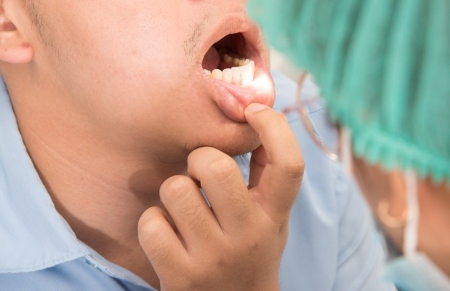Enter your email to receive the CareQuest newsletter:
August 11, 2025
Can someone transmit human papillomavirus (HPV) even if they don’t have any visible lesions or symptoms? Is it true that the HPV vaccine is not recommended for older adults because they may have already been infected? Do only girls need the HPV vaccine?
The questions came fast during CareQuest Institute’s recent webinar, “Human Papillomavirus (HPV) and Dentistry: What Every Provider Should Know.” So fast, in fact, that the hour of education ended before the expert speaker could answer all of them. That speaker — Lilliam Marie Pinzon, DDS, MS, MPH, Associate Professor, Dental Medicine at Kansas City University — answered many questions for the 700+ learners who joined. She then took time out of her preparations for the fall semester to answer several more, which are summarized below.

Why is this knowledge critical for the dental team? HPV is a leading cause of oropharyngeal cancer, and dental providers are uniquely positioned as the first line of defense in early detection of such cancers. Yet, despite its prevalence, HPV is often overlooked and not well understood in dental education and care delivery, leaving dental providers unprepared in addressing these questions with patients.
(Note: You can view the full webinar, including the Q&A, in the CareQuest Institute webinar library.)
Q: If someone tested positive for HPV at a young age but now tests negative, are they still at risk? Do they need the vaccine? Can they transmit the disease?
A: Yes, they still need the HPV vaccine. Even if someone previously tested positive and now tests negative, they are not immune. And being previously infected does not provide immunity, so vaccination is still important for protection.
Q: Is there a correlation between the rise of vaping and HPV? Could vaping be considered a risk factor for HPV or related cancers?
A: Well, if it’s tobacco, it is a risk factor for developing cancers. Not just HPV, but lung cancer or other cancers because it’s tobacco, which potentially increases cancer risk over time.
And then your immune system is going to get affected if you’re consuming tobacco. So that increases the risk for you to be a cancer patient at a certain point.
Q: Is it true that the HPV vaccine is not recommended for older adults because they may have already been infected? What about people over 40?
A: The HPV vaccine is generally recommended up to age 26, as that’s the age group most likely to benefit before potential exposure to the virus. However, the age range has been expanded in some cases. (You can learn more about the guidance on the CDC website.)
Q: Is there still a misconception that only girls need the HPV vaccine? What can be done to address this?
A: Well, I think we need to be more open about the kind of cancers that HPV can cause in men, because I don’t think that’s been communicated properly, and I don’t know why. I also know that there are some countries where they're promoting the vaccine mainly in girls, not in boys. And the reason . . . I don’t know it. But that’s a fact.

So, I think we need to improve the communication and outreach. And talk more openly. It’s just a difficult topic to talk professionals about because, you know, people feel embarrassed, or they don’t want to talk about these topics. But as health professionals we need to normalize this topic, because by normalizing the topic, we can save lives.
Q: In clinical practice, if a lesion is observed in the mouth, is there value in waiting 1–2 weeks before reevaluating the patient?
A: Yes, there can be value in waiting 1–2 weeks. Some lesions may be related to temporary conditions like tonsillitis, which can resolve on their own. Waiting allows time to see if symptoms improve. However, if the lesion persists after that period, it’s important to refer the patient for further evaluation, as it could be something more serious like HPV-related oropharyngeal cancer, which can sometimes be misdiagnosed as a benign condition.
Q: Do patients trust the dental team to provide recommendations about HPV and its prevention?
A: Yes, I think so. We are health professionals, and they trust their mouth to us. They’re seeking our services. They’re paying us. It is our responsibility to feel more like we should contribute to the prevention of cancer cases. It is in our hands to also provide feedback and education — not just in this topic [but] on many topics that we can educate our patients about. By educating them, we build trust.